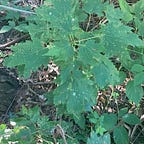I hate you. I’m dying. Screams that sounded like someone was ripping my heart out. These extreme expressions of agony have been apart of my life since I was a child. As an eight year old, I threatened to hurt myself and my family and ran away. I hardly made it to the end of the street, but the incident startled my parents enough to get me a therapist. I’ve had these “tantrums” since before I was even capable of speech, saying and doing things that could be described on a scale from disturbing to violent. In these moments in the eyes of most, I would look like a severely emotionally disturbed person, or even an abusive one.
So why did I behave this way? The best way for me to explain it to you is to give you a hypothetical. Imagine you’re outside in the snow, naked. An unpleasant situation to begin with. However, you can’t even find the time to warm yourself before you find yourself surrounded by people. Each person has a wolf beside them, and their growls suggest danger. Without prompting, the people begin throwing sharp rocks and broken bottles at you. You have nothing to block them with, so you try your best to use your arms as shields. With every movement the wolves growl louder, so running doesn’t seem like an option. What can you do? You fight, punching and kicking your way through the crowd. The only thing you want is to be somewhere safe, warm. Insults and screams fall from your mouth, as you flail yourself in an attempt to find solace. However, no one’s actually throwing anything at you, and your safe in your warm house. The wolves could be vacuums, radiators, an unexpected change in plans. The people could be your loved ones, their stones being their loud phone conversations, or them asking you questions with too many answers for you to comprehend. These things hurt you just like broken glass would, and sometimes you would prefer an actual physical attack to these invisible ones. Maybe you hit yourself to try to block out the pain the vacuum is causing you, numb your nerves with tangible pain.
Do you have a better understanding of why I behave this way now? I am autistic, with severe sensory sensitivities. Until I was sixteen, no one in my life understood why I would burst into episodes of rage, terror and violence. In another article I will explain my experience with misdiagnosis, hospitalization and undiagnosed autism. Since my diagnosis I have developed enough coping mechanisms that have drastically lessened the severity and frequency of my meltdowns. In this article I want to address living with the consequences of actions you can’t control.
There was no way for me to control or stop my behavior when I was younger, as I had no means to self-regulate and cope accordingly. However, I still have to acknowledge the effects my meltdowns had on those around me. People felt as if they lost trust with me. It’s difficult to trust someone who goes from being calm to screaming at you that you are causing them extreme pain. You may love them, but they are hurting you. It’s unbearably painful. And I have lashed out in my pain, yelling and screaming and running away. I lost friends, trust. My screaming in meltdowns were abusive, and I hated myself for that to the point where I would punish myself.
I’m writing this article to not only educate you about my experience with autistic meltdowns and sensory sensitivities, but also to introduce and reinforce a concept. This concept being that you can act abusively without being an abusive person, and that this does not make you a horrible person. I struggle not to loathe myself for my actions and how I hurt the people I love the most. Hating myself is not helpful, and does not help the people I pushed away. Recognizing the damage done by me, and doing what I can to provide myself with the tools to avoid future meltdowns is. I work to validate the emotions of those I have hurt, and work to rebuild my relationship with them.
The past may be written, but you’re still holding the pen. Don’t stop writing.
